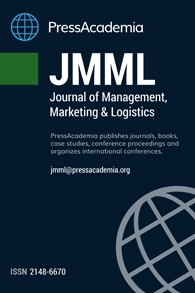GREEN LOGISTICS PRACTICES IN TURKEY
GREEN LOGISTICS PRACTICES IN TURKEY
Purpose- Since the beginning of the 1990’s, researches on using environmentally friendly technologies in logistic practices to mitigate the damage to environment have begun. A new application area, green logistic, has emerged which takes environmental and social factors into consideration, which is interested with the goods that are produced and distributed in a sustainable manner, and that aims to minimize energy consumption in logistics activities, minimize wastes and manage operations. This study aims to present the green logistics practices in Turkey. Methodology- The indicators table was prepared with datas from literature review, face-to-face interviews with firms in the scope of the research field and questionnaire with questions about activities. Face-to-face and phone calls with company officials, sustainability reports from the green logistics sector, and articles and news on the internet related to the subject were utilized. Findings- It is determined that logistics companies in Turkey adopt green logistics indicators. Conclusion- The study reveals that green logistics applications are seen in Turkey and companies are trying to enrich their business policies with a green point of view and that green logistics will provide competitive advantages in terms of logistics companies in the coming years.
Keywords:
Green logistics, reverse logistics, sustainable logistics supply chain, supply chain management,
___
- Autry, C., Daugherty, P., Richey, G. (2001), “The Challenge of Reverse Logistics in Catalog Retailing”, International Journal of Physical Distribution & Logistics Management, 31, pp.26-37.
- Babic, D., Jaramaz, D., Bajor, I. (2013),”Urban Forestry As A Function of Green Logistics”, Faculty of Traffic and Transport Science, Croatia.
- Banister, D., Button, K. (1993), Transport, the Environment and Sustainable Development, 1st Edition, Routledge, London.
- Birleşmiş Milletler Dünya Çevre Kalkınma Komisyonu Raporu, 1987.
- Confente, I., Russo, I. (2009), “Green Logistics in Italy: new challenge for sustainable development”, 12th International QMOD and Toulon- Verona Conference, International Conference on Quality and Service Sciences (ICQSS), Aug. 27-29, 2009, Verona, Italy.
- Denisa, M., Zdenka, M. (2015), “Perception of implementation processes of green logistics in SMEsin Slovakia”, 4th World Conference on Business, Economics and Management, WCBEM, April 30 – May 2, 2015, Ephesus, Turkey.
- Evangelista, P., Huge-Brodin, M., Isaksson, K., Sweeney, E. (2012), “A Case Study Investigation on Purchasing Green Transport and Logistics Services”, National Institute for Transport and Logistics, Dublin, Ireland.
- Gross, W., Zesch, F., Gelau, T., Hayden, C., Bötel, M., Brock, M. (2013), Costs and Benefits of Green Logistics, 4flow Supply Chain Management Study, Berlin, Gerrmany.
- Hickford, A.J. (2007), Developing innovative and more sustainable approaches to reverse logistics and the collection, recycling and disposal of waste products from urban centres, Literature Review, Transportation Research Group.
- İnce, M.E. (2013), Yeşil Tedarik Zinciri Yaklaşımı ve Örnekleri, Konya Ticaret Odası, Konya.
- Jaller, M., Sánchez, S., Green, J., Fandiño, M. (2015), “Quantifying the impacts of sustainable city logistics measures in theMexico City Metropolitan Area”, The 9th International Conference on City Logistics, Tenerife, Canary Islands (Spain), June 17-19, 2015, Transportation Research Procedia, 12, pp.613-626.
- Kim, S., T., Han, C., H., (2011), “Measuring Environmental Logistics Practices”, The Asian Journal of Shipping and Logistics, 27(2), pp. 237258.
- Lopes, C.P., Akabane, G., Soares, W.L., Barreto, R.M. (2010), “Toyota Motor European (TME) Sustainable Logistics: An Example to Brazil”, POMS 21st Annual Conference, May 7-10, 2010, Vancouver, Canada.
- Rogers,D. S.& Tibben-Lembke,R. S. (1999). Going backwards: Reverse logistics trends and practices,The University of Nevada, Reno Center for Logistics Management, Pittsburgh, PA, Reverse Logistics Executive Council.
- Seroka, O. (2014), “The development of green logistics for implementation sustainable development strategy in companies”, 1st International Conference Green Cities 2014, May 19-21, 2014, Szczecin, Polska, pp.302-309.
- Tao, J. (2001), Researches on Establishment Model of Green Logistics System, Zhongyuan University of Technology, China.
- Wichaisri, S., Sopadang, A. (2014), Sustainable Logistics System: A Framework and Case Study, Department of Industrial Engineering, Faculty of Engineering, Chiang Mai University, Chiang Mai, Thailand.
- Zhang, G., Zhao, Z. (2012), “Green Packaging Management of Logistics Enterprises”, 2012 International Conference on Applied Physics and Industrial Engineering, Physics Procedia 24, pp.900-905.
- Yayın Aralığı: Yılda 4 Sayı
- Başlangıç: 2014
- Yayıncı: PressAcademia
Sayıdaki Diğer Makaleler
AN EFFECTIVE MANAGEMENT TOOL: SALES & OPERATIONS PLANNING (S&OP) and MATURITY MODEL
COLD CHAIN LOGISTICS FOR FROZEN FOOD AT TOURISM DESTINATIONS
İsılay TALAY DEGİRMENCİ, İsmail KARAYUN, Oznur OZDEMİR AKYİLDİRİM
PRIORITIZATION OF FAILURE MODES IN FOOD LOGISTIC PROCESS WITH A FUZZY APPROACH
COMPARISON OF THE PORT AUTHORITY'S EFFICIENCY IN TURKEY
UNDERSTANDING EFFECTS OF INNOVATIVE AND COLLABORATIVE APPROACHES ON SUPPLY CHAIN PERFORMANCE
MULTI-CRITERIA DECISION ANALYSIS MODEL FOR WAREHOUSE LOCATION IN DISASTER LOGISTICS
Aylin OFLUOGLU, Birdogan BAKİ, İlker Murat AR
REVERSE LOGISTICS AND APPLICATION OF ARAS METHOD
AN ARTIFICIAL NEURAL NETWORK APPROACH FOR THE LOGISTICS CENTER LOCATION SELECTION
